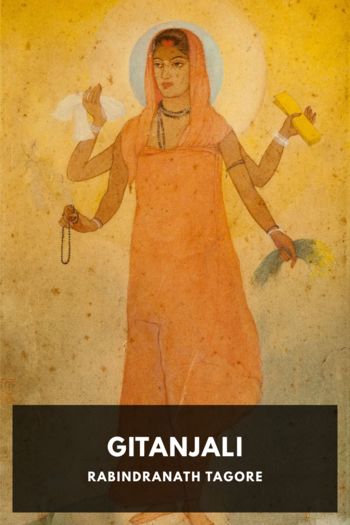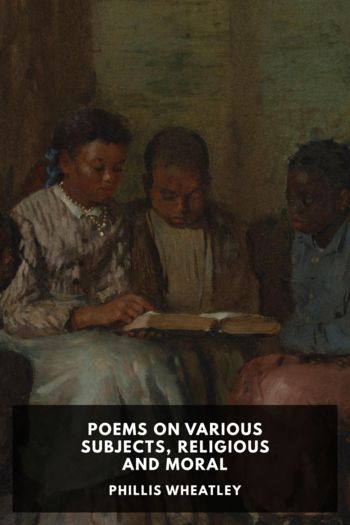My Reminiscences by Rabindranath Tagore (free children's ebooks pdf .TXT) 📕

- Author: Rabindranath Tagore
Book online «My Reminiscences by Rabindranath Tagore (free children's ebooks pdf .TXT) 📕». Author Rabindranath Tagore
I cannot claim to have been a passive witness of the spread of my reputation as a poet. Though Satkari Babu was not a teacher of our class he was very fond of me. He had written a book on Natural History—wherein I hope no unkind humorist will try to find a reason for such fondness. He sent for me one day and asked: “So you write poetry, do you?” I did not conceal the fact. From that time on, he would now and then ask me to complete a quatrain by adding a couplet of my own to one given by him.
Gobinda Babu of our school was very dark, and short and fat. He was the Superintendent. He sat, in his black suit, with his account books, in an office room on the second storey. We were all afraid of him, for he was the rod-bearing judge. On one occasion I had escaped from the attentions of some bullies into his room. The persecutors were five or six older boys. I had no one to bear witness on my side—except my tears. I won my case and since then Govinda Babu had a soft corner in his heart for me.
One day he called me into his room during the recess. I went in fear and trembling but had no sooner stepped before him than he also accosted me with the question: “So you write poetry?” I did not hesitate to make the admission. He commissioned me to write a poem on some high moral precept which I do not remember. The amount of condescension and affability which such a request coming from him implied can only be appreciated by those who were his pupils. When I finished and handed him the verses next day, he took me to the highest class and made me stand before the boys. “Recite,” he commanded. And I recited loudly.
The only praiseworthy thing about this moral poem was that it soon got lost. Its moral effect on that class was far from encouraging—the sentiment it aroused being not one of regard for its author. Most of them were certain that it was not my own composition. One said he could produce the book from which it was copied, but was not pressed to do so; the process of proving is such a nuisance to those who want to believe. Finally the number of seekers after poetic fame began to increase alarmingly; moreover their methods were not those which are recognised as roads to moral improvement.
Nowadays there is nothing strange in a youngster writing verses. The glamour of poesy is gone. I remember how the few women who wrote poetry in those days were looked upon as miraculous creations of the Deity. If one hears today that some young lady does not write poems one feels sceptical. Poetry now sprouts long before the highest Bengali class is reached; so that no modern Gobinda Babu would have taken any notice of the poetic exploit I have recounted.
Part III X Srikantha BabuAt this time I was blessed with a hearer the like of whom I shall never get again. He had so inordinate a capacity for being pleased as to have utterly disqualified him for the post of critic in any of our monthly Reviews. The old man was like a perfectly ripe Alfonso mango—not a trace of acid or coarse fibre in his composition. His tender clean-shaven face was rounded off by an all-pervading baldness; there was not the vestige of a tooth to worry the inside of his mouth; and his big smiling eyes gleamed with a constant delight. When he spoke in his soft deep voice, his mouth and eyes and hands all spoke likewise. He was of the old school of Persian culture and knew not a word of English. His inseparable companions were a hubble-bubble at his left, and a sitar on his lap; and from his throat flowed song unceasing.
Srikantha Babu had no need to wait for a formal introduction, for none could resist the natural claims of his genial heart. Once he took us to be photographed with him in some big English photographic studio. There he so captivated the proprietor with his artless story, in a jumble of Hindusthani and Bengali, of how he was a poor man, but badly wanted this particular photograph taken, that the man smilingly allowed him a reduced rate. Nor did such bargaining sound at all incongruous in that unbending English establishment, so naive was Srikantha Babu, so unconscious of any possibility of giving offence. He would sometimes take me along to a European missionary’s house. There, also, with his playing and singing, his caresses of the missionary’s little girl and his unstinted admiration of the little booted feet of the missionary’s lady, he would enliven the gathering as no one else could have done. Another behaving so absurdly would have been deemed a bore, but his transparent simplicity pleased all and drew them to join in his gaiety.
Srikantha Babu was impervious to rudeness or insolence. There was at the time a singer of some repute retained in our establishment. When the latter was the worse for liquor he would rail at poor Srikantha Babu’s singing in no very choice terms. This he would bear unflinchingly, with no attempt at retort. When at last the man’s incorrigible rudeness brought about his dismissal Srikantha Babu anxiously interceded for him. “It was not he, it was the liquor,” he insisted.
He could not bear to see anyone sorrowing or even to hear of it. So when any one of the boys wanted to torment him they had only to read out passages from Vidyasagar’s Banishment of Sita; whereat he would be greatly exercised, thrusting out his hands in protest and begging and praying of them to stop.
This old man was the friend





Comments (0)